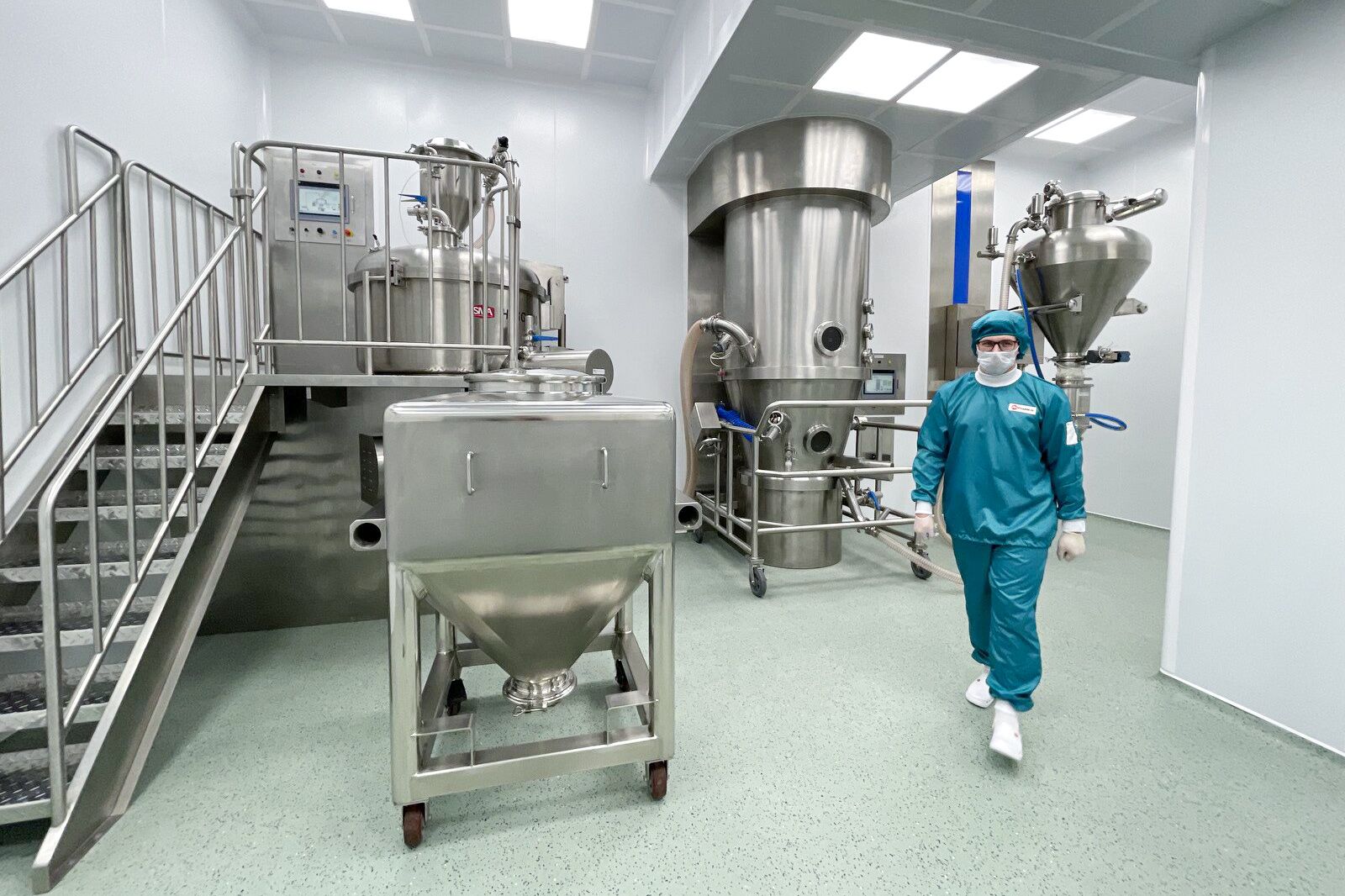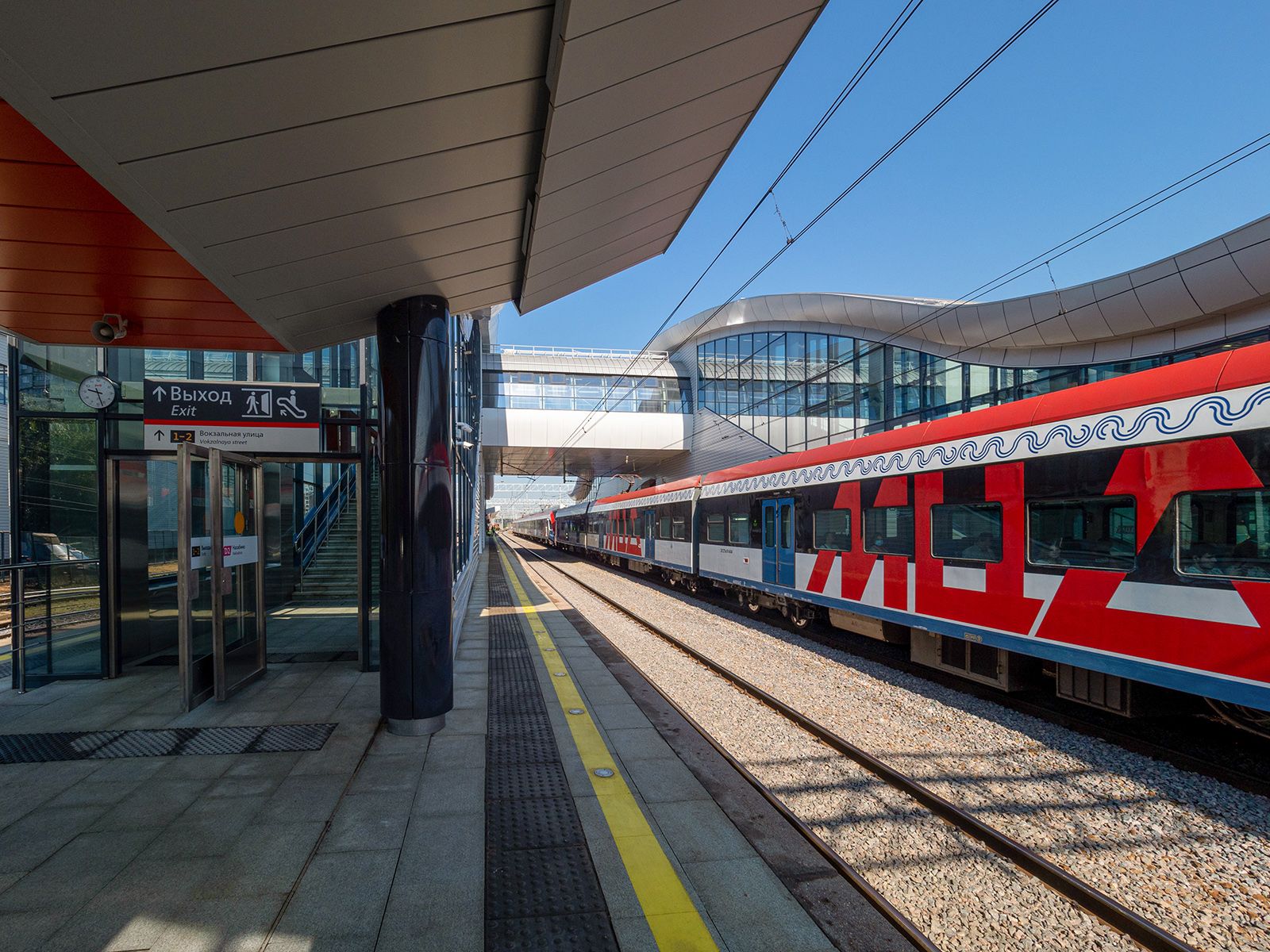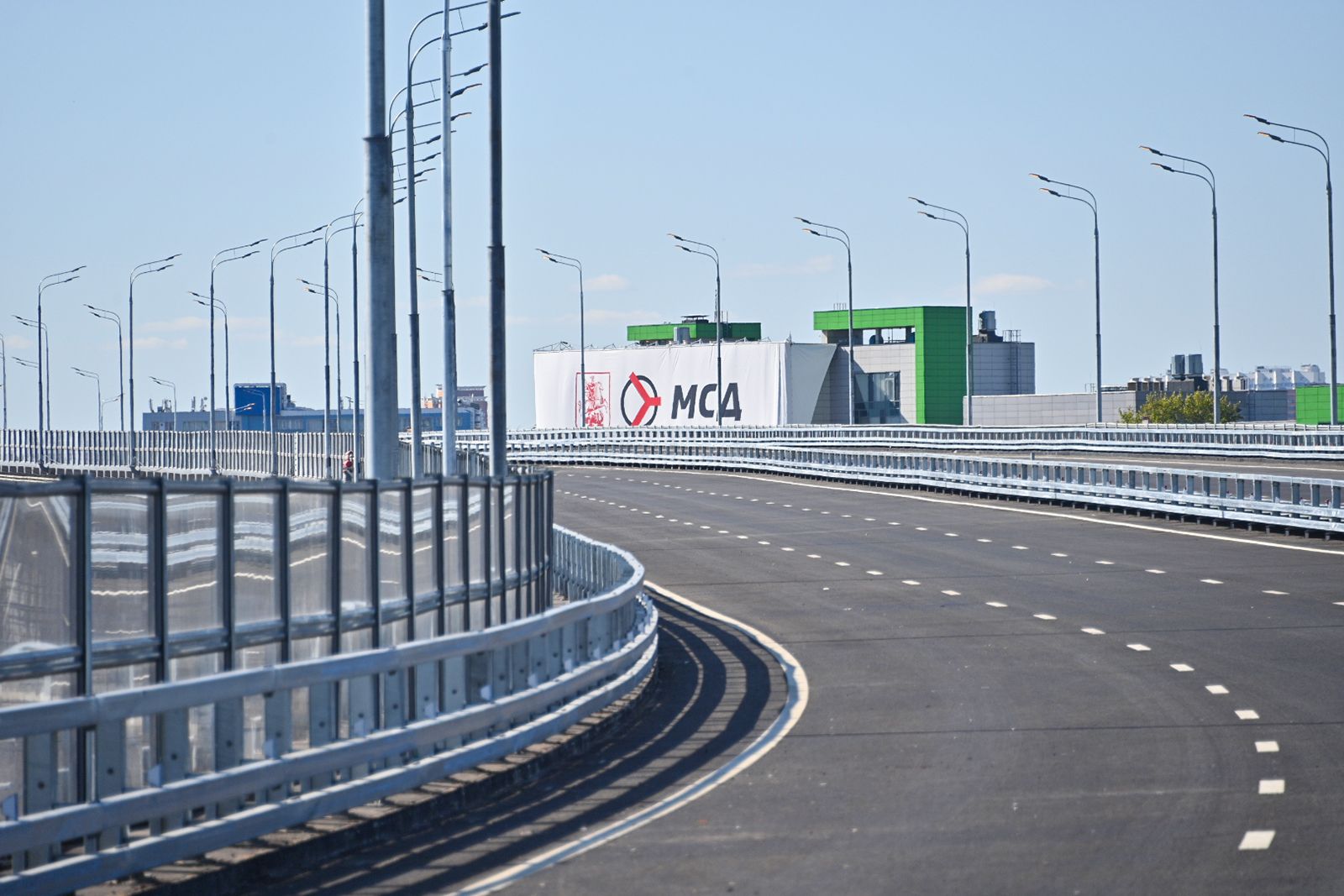Sergei Sobyanin reports to Vladimir Putin on the implementation of major projects in Moscow
(16)(6).jpg)
Vladimir Putin had a working meeting with Moscow Mayor Sergei Sobyanin. They discussed economics, industry, healthcare and the development of the transport infrastructure in Moscow.
Sergei Sobyanin says that in recent years Moscow has implemented a number of large-scale projects and has become one of the world's leading megalopolises. Even the imposed sanctions were not an obstacle for the program.
Economic growth
In the economy, the Russian capital ranked third in terms of gross domestic product including the purchasing power parity among world cities.
“We have doubled the volume of investment in 5 years; the volume of the manufacturing industry has increased by 40% without considering the Moscow Oil Refinery; and with the new capacities of the Moscow Oil Refinery, the output of manufacturing industries in Moscow will double,” said Sergei Sobyanin.
Last year, they reached an unprecedented level of 4.9 trillion rubles.
The most important trend of the recent years is the industrialization of Moscow: the construction of new and expansion of existing industrial facilities. More than 3,500 large, medium and small industries are operating in the city. In 2017-2022, manufacturing output increased by 40% (excluding oil refining). In 2022, the growth of the manufacturing industry amounted to 10.4%.
Unemployment is at lowest levels (0.39%). In five years, the number of jobs in Moscow has increased by almost 300,000.
The largest employer is a dynamically developing small and medium business, which employs 3.2 million people.
Moscow is implementing several projects that will become drivers of economic development in the coming years. 120,000 square meters of industrial area have been built in the Rudnevo industrial park. The core of this industrial complex will be the production of unmanned aerial vehicles. In addition, national enterprises performing strategic tasks such as JSC Almaz-Antey are located there. The capacity of the industrial park will be tripled in the coming years.
Another crucial area for the country and the city is the development of pharmaceuticals.
“In Zelenograd, we are currently launching a large cluster for the production of medicines, primarily vital medicines, ranging from viruses to cancer drugs, and two-thirds of them have never been produced in Russia. In the coming years, we will also increase this cluster by two-thirds, but even today the largest Russian enterprises are developing in the cluster; we provide them with all possible assistance and conclude long-term contracts which is why they feel confident and develop the production of new drugs,” Sergei Sobyanin specified.

Sergei Sobyanin and Valentina Matvienko open a pharma plant in ZelenogradSergei Sobyanin opens serial production at Moskvich plant
In late November 2022, Moscow resumed the production of the Moskvich car and it plans to establish its own platform for the production of electric vehicles. The Moscow Mayor notes that despite efforts to block the production of cars, Moscow plans to create its own domestic platform for electric vehicles in two years and launch its own cars with most of the components made in Russia.
Development of the Moscow electric car cluster will create about 40,000 jobs at the flagship company and component suppliers in Moscow and other Russian regions.
“A lot of work has been done in each of these areas, and each of them is extremely important. I recall that a few years ago Moscow’s ability to provide normal traffic in the city and in the city squares was highly questionable. Of course, with such a huge population and density, this is not an easy task, but in general, Moscow succeeds in this area better than other world megalopolises do. The healthcare system, education, and the urban environment as a whole are also developing. So I want to thank you and your entire team for your work. I hope that work will continue at such the same pace and with the same quality in the near future,” Vladimir Putin concluded.
Large-scale transport projects
Sergei Sobyanin considered the development of transport the most important area of work for Moscow, which determines the development of its economy and ensures comfortable life of residents. “Over the years, with your support, we have implemented a number of projects related to the underground metro, surface metro, and roads,” the Moscow Mayor added. He says that in the coming days, the Big Circle Line (BCL) will be fully opened for passengers.
“We have completed the project, and, if possible, we would like to invite you to open the entire Big Circle Line in the next few days. It will be a very serious help for the development of the Metro, the release of other lines, surface transport, and so on. This is the largest highway in the world among the circle metro lines,” said the Moscow Mayor.

Moreover, this year the Russian capital will open two new Moscow Central Diameters - MCD-3 and MCD-4. According to Sergei Sobyanin, the surface metro lines are Moscow's largest infrastructure project. A similar project has been implemented in London for two decades.
“In autumn, both MCDs (MCD-3 and MCD-4) will be launched. One of them will be connected to the St Petersburg high-speed railway line and will run from Zelenograd in the direction of Kazan. It directly passes through the whole city, through the central stations. MCD-4 will pass through all the stations of the city, with the exception of one. It is also a very complex project, very important for the city,” said Sergei Sobyanin.

Another area is construction of the largest highways, the Moscow High-Speed Diameter (MHSD). The construction of the highway with a length of 68 kilometers will be completed in 2023. “Last year, we launched the first stage of the Moscow High-Speed Diameter. This year, we will complete the second stage and the construction of the Southern Lateral Road, a large project, 40 kilometers long; we will connect the Moscow High-Speed Diameter with Kazan, which our federal colleagues are now building, This is a federal road, and we will connect it with the diameter, too. Thus, there will be a road from Kazan to St. Petersburg, and there is also a high-speed highway here,” said Sergei Sobyanin.
The construction of the Moscow High-Speed Diameter and the Southern Lateral Road will complete the system of chord highways in Moscow. It is, in fact, the fourth transport ring in the middle part of the city, which is an alternative to the Moscow Ring Road, the third transport ring and the historical center driveway.
New highways will become the basis of the street road network in Moscow. “These are the most challenging huge projects, because they go mainly on overpasses, along railways, with the demolition of some ownerless and other buildings, through engineering communications, through industrial zones, and so on. Nevertheless, it is about to be finished, this year all these projects will be completed,” the Moscow Mayor added.

The city has built 1,200 kilometers of new roads, 359 artificial structures (bridges, flyovers, tunnels) and 291 off-street pedestrian crossings. Sixteen outbound highways have been reconstructed, 19 interchanges on the Moscow Ring Road have been built and reconstructed, dedicated lanes with a length of over 400 kilometers have been equipped for public transport.
The main street and road network has been extended by 20%, and the number of artificial structures has increased by 50%.
Housing construction and renovation program
Last year, 6.8 million square meters of new housing were commissioned in Moscow. In terms of a five-year cycle, we have actually doubled the scale of housing construction (in the early 2010s, about three million square meters of housing was built in Moscow per year).
As part of the renovation program, 107,000 former residents of five-story buildings have already been resettled. In the next three years, the resettlement rate will double. 200,000 more people will receive new apartments. Houses under the renovation program are built in compliance with high quality standards.

Medicine projects of the year
Another major city project is the development of an outpatient primary care unit. In 2023, the largest healthcare projects will be completed in Moscow. We are about to complete a number of projects including Kommunarka Multi-Purpose Clinical Center, Moscow Clinical Scientific Center, Infectious Diseases Clinical Hospital No.1, the new building of the Children's State Hospital of St. Vladimir in Sokolniki and six flagship emergency centers.
In 2023, reconstruction of 124 healthcare institutions is to be completed. A large amount of tasks is being carried out, almost everything is being updated: roof, planning, utilities, facades.

“In Moscow, the situation seems to be favorable, yet a large number of clinics were built in the 50s, 60s, and even in the 40s and they are obsolete. We are reconstructing all the dilapidated polyclinic buildings. In fact, we keep only a frame, everything else is new, and new polyclinics are being built in this area. This year, we will complete the reconstruction of half of the Moscow polyclinic buildings, and there will be 200, in fact, new buildings equipped according to the new, most modern standard. This will obviously improve the quality of outpatient care for Muscovites,” said Sergei Sobyanin.
In 2022, the reconstruction of 77 city polyclinics was completed. A large-scale program for the renewal of medical institutions has covered half of the outpatient department in Moscow. 201 polyclinics will be upgraded.

Digital medicine: which innovations help doctors do their job
Moreover, an artificial intelligence system based on big data is being introduced into the doctors’ practice.
“In Moscow, a structured database including two billion data units has been developed and systematized. It is one of the largest bases in the world, which makes it possible to process and train artificial intelligence for decision-making,” said the Moscow Mayor.
Currently, 8 million diagnoses have been made using computer vision in various fields, from oncology to lung diseases.
A system of medical prompts has been developed for primary care physicians.
“Nine million diagnoses have already been made using artificial intelligence. It is clear that doctors themselves ultimately make a diagnosis, but artificial intelligence helps them correctly structure laboratory appointments, process them, help write a prescription, and correctly diagnose,” added Sergei Sobyanin.
The system of polyclinic solutions is based on electronic medical record.
MES will become the basis for the Russian electronic school
The Moscow Electronic School (MES) project is being developed in the Russian capital. Today, the resource contains about two million content units, and people use it about 4.5 million times a day.
MES is a deep systemic project that improves the quality of school education. It serves as an assistant for both students and teachers. When giving a lesson, the teacher can use the necessary content: teaching aids, laboratories, video laboratories, test papers. They can also upload homework to the student's electronic profile on the platform.
MES is expected to become the basis for the My School Russian educational platform.

Sergei Sobyanin: Moscow Electronic School is now a pivotal part of Moscow education
“In collaboration with the Ministry of Education and the Ministry of Digital Development, we have developed a project where the Moscow Electronic School will be the basis for the Russian electronic school called My School. We do not need to reinvent the wheel. We have been working on the project for many years, adapting it to the requirements of the Ministry of Education,” Sergei Sobyanin stressed.
Digital transformation of the social sector and urban economy
Large-scale and unique information systems have been developed in all social sectors and urban economy to ensure the growth of the service quality provided.
Artificial intelligence, speech recognition, 3D visualization and other future technologies are widely used in the information systems.
Moscow is using digital technologies for building design. One of them is Moscow Digital Twin.
“This planning and ground planning are a perspective, real situation including facades of houses, and three-dimensional design. In addition to the surface network, we also built the entire underground network of engineering communications, we see what is on the ground and what is underground,” said Sergei Sobyanin.
The Digital Twin is an up-to-date 3D model with an area of more than 2,500 kilometers, which is the basis for making decisions on urban planning, landscaping and security. The project has become a design and construction tool of new housing and industrial complexes, buildings and structures. Today, 3,000 buildings have already been built using the platform, including the new Lomonosov cluster.
The elements of the Digital Twin are 12 million annually updated aerial photographs, three-dimensional panoramas of roads and streets (the archive of panoramas contains data from 2013), 3,400 panoramic images covering the entire territory of old Moscow from a bird's eye view, more than 5,000 analytical layers with different information, from issued building permits to organizations that are located in buildings, more than 8,000 units of urban equipment in dynamic layers, which allows specialists to monitor the removal of construction and demolition waste, the movement of urban public transport, the progress of other works in real time, three artificial intelligence algorithms used to develop a 3D city model. Artificial intelligence technologies are used to improve detail, color correction of original photographs, and to remove individual objects from aerial photographs, in particular cars.
.jpg)
A digital solution was also implemented in areas related to housing stock management. Due to the difficulty in organizing meetings of homeowners, almost all decisions for residents were made by management companies, which troubled Muscovites.
“We developed an electric home system where residents today can make all the necessary decisions using their smartphone, their phone or their computer to somehow resolve this problem and involve Muscovites in managing their house so that they have a real opportunity,” the Moscow Mayor said.
The voting results are reliable: they are supported by the corresponding digital passports. In the last year alone, 97% of apartment buildings switched to the Electric Home platform.
E-advertisements and neighborhood chats have become the most requested functionality of the platform making the Electric Home platform the largest community of neighbors in Russia. The platform helps revive traditions of good neighborliness, especially for new generations, who find it much easier to get to know each other and communicate online.
In addition, the Moscow Mayor called the video surveillance system an important system that ensures the security of Moscow. The cameras are connected to a face recognition system, which in a matter of seconds allows us to identify a person whose photo is uploaded to the database of law enforcement agencies.
“The video surveillance system is primarily aimed at ensuring safe life in the city. At present, 7,713 people who are on the federal wanted list have been detained in the metro and in the city,” Sergei Sobyanin said.
Thanks to the video surveillance system, the number of burglaries has decreased significantly. They will be found even if they completely cover their face.
The Moscow Mayor highlights that the development of all Moscow programs will continue. This will allow the city to develop comprehensively, qualitatively and dynamically.